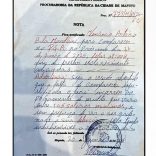Mozambique: Mondlane says has information that he will be arrested upon his return from Europe - ...
Fraud suspected in Gurue – AIM report, Mozambique Elections

The most common way of doing this is simply to add a mark to a ballot, with a pen or an inky finger, to make it look as if the voter has tried to vote for more than one candidate. Alternatively, perfectly valid votes can surreptitiously be moved to the pile of invalid votes. File photo ( For illustration purposes only): Pinnacle News
There is now clear evidence that dishonest polling staff deliberately invalidated votes for opposition parties in the town of Gurue, in the central Mozambican province of Zambezia, in Wednesday’s municipal elections.
An invalid vote is a ballot where there are marks against more than one candidate, or where the voter has written words on the ballot paper or has otherwise defaced it.
There are always a few invalid votes at any polling station, but the number is unlikely to go above a couple of per cent, particularly in urban areas such as municipalities, where the majority of the electorate is likely to be literate.
But in Gurue on Wednesday the number of invalid votes was a highly suspicious six per cent, according to a report in the latest issue of the Mozambique Political Process Bulletin, published by the anti-corruption NGO, the Centre for Public Integrity.
Out of the 67 polling stations in Gurue, nine had more than 10 per cent invalid votes. The most obviously fraudulent station was 410506A, at the Aerodromo primary school, where 21 per cent of the votes were ruled invalid. Polling station 410101 had 14 per cent invalid votes – but the adjacent station 41012 had a normal two per cent invalid votes.
This is a strong indication that the polling station staff (MMVs) at station 41012 behaved honestly, while the MMVs at 410506A and 410101 deliberately invalidated votes.
The most common way of doing this is simply to add a mark to a ballot, with a pen or an inky finger, to make it look as if the voter has tried to vote for more than one candidate. Alternatively, perfectly valid votes can surreptitiously be moved to the pile of invalid votes.
The deliberate invalidation of votes has occurred repeatedly in Mozambican elections, and has even been publicly mentioned by the National Elections Commission (CNE) and by the Constitutional Council, the highest body in matters of constitutional and electoral law. But nobody has even been arrested for such vote tampering.
Nowadays such frauds should be impossible because they should be detected by the MMVs appointed by the political parties. Thanks to a change in the electoral law in 2014, at each polling station the three parties represented in parliament – the ruling Frelimo Party, the former rebel movement Renamo, and the Mozambique Democratic Movement (MDM) – have the right to appoint an MMV. The parties are also entitled to have monitors at every polling station.
Each ballot paper is displayed publicly by the polling station chairperson who classifies it as valid, invalid or blank. If other MMVs or party monitors disagree, they should say so. AIM has seen such disagreements at polling stations, and they usually result in a discussion leading to a unanimous appraisal of the ballot paper. If no agreement is possible, the ballot paper goes in a pile of “contested votes” which will later be considered by the District Elections Commission.
So what happened to the Renamo and MDM polling monitors and MMVs? How come they did not spot the invalidation of votes? Were they not in the room as it happened?
This time the invalid votes did not make a difference to the results. With 92 per cent of the 67 polling stations processed, Frelimo had a comfortable lead, with 12,507 votes to 10,601 for the MDM and 1,200 for Renamo.













Leave a Reply
Be the First to Comment!
You must be logged in to post a comment.
You must be logged in to post a comment.